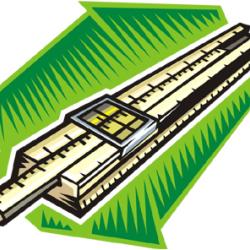Source Institutions
Source Institutions
Add to list Go to activity

Learners make their own simple slide rules out of paper and learn how they work. The activity starts by having learners make an "adding slide rule," which is not a very practical device but is easier to understand than the more common but more complicated multiplication slide rule. The adding slide rule uses a simple scale, while the multiplication slide rule uses a logarithmic scale. Background information is included about the history of this elegant mathematical invention: how it was invented hundreds of years ago, and how it was used until the 1970s when calculators replaced them. [Activity is publicly available through a web crawler capture on Archive.org.]
- 5 to 10 minutes
- 10 to 30 minutes
- 1 cent - $1 per group of students
- Ages 8 - adult
- Activity, Lesson/Lesson Plan
- English
Quick Guide
Materials List (per group of students)
- rulers
- Copies of Master A, “Slide Rule” (in PDF)
- scissors
- masking tape
- 2 transparent rulers, or 2 metersticks
- one copy of Master B, pictures of Oughtred, Napier and NASA “computers” (in PDF)
- one overhead transparency with Master A copied on it
Subjects
-
Engineering and Technology
-
Computing
- Information Technology
-
Engineering
- Computer Engineering
-
Technology
- Information and Communication
-
Computing
-
Mathematics
-
Algebra
- Patterns
-
Number and Operations
- Exponents
- Multiples and Factors
- Operations
- Representation
-
Algebra
-
The Nature of Technology
-
Technology and Society
- Technology and History
-
The Design Process
- Invention and Innovation
-
Technology and Society
Audience
To use this activity, learners need to:
- see
- read
- touch
Learning styles supported:
- Involves hands-on or lab activities
Other
Includes alignment to state and/or national standards:
Access Rights:
- Free access
By:
Rights:
- All rights reserved, OMSI, 2005
Funding Source:
- National Science Foundation ESI, 0206403
